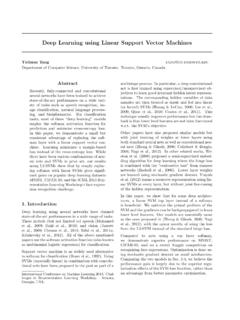Transcription of Grief Therapy and the Reconstruction of Meaning: …
1 Grief Therapy and the Reconstruction of Meaning: From Principles to PracticeRobert A. Neimeyer Laurie A. Burke Michael M. Mackay Jessica G. van Dyke Stringer Springer Science+Business Media, LLC 2009 AbstractViewed from a constructivist perspective,grieving is a process of reconstructing a world of meaningthat has been challenged by loss. Although most peoplesuccessfully navigate bereavement and retain or return topre-loss levels of functioning, a significant proportionstruggle with protracted Grief , and are unable to findmeaning in the wake of an unsought transition. For theseindividuals, constructivist therapists have a number ofstrategies at their disposal that foster meaning making andhelp clients reestablish a coherent self-narrative that inte-grates the loss, while also permitting their life story tomove forward along new lines.
2 After reviewing theory andevidence that scaffolds this constructivist conceptualiza-tion, this article draws on excerpts of Therapy with twobereaved clients to illustrate how narrative retelling, ther-apeutic writing, a focus on metaphorical language, andthe use of visualization can all be viable strategies inhelping individuals reconstruct meaning in the wake ! Grief Therapy ! meaning -making!ConstructivismMou rning the death of a loved one is a ubiquitous humanexperience. Practically all individuals will be multiplybereaved at various points in their lives, through thedeaths of parents, spouses, siblings and friends, and forsome, their own children.
3 Reactions to these losses canbe intense, as reflected in depressed mood, anxiety, sad-ness, lack of interest in re-engaging in the world orforming new relationships (Bonanno and Kaltman2001;Stroebe et ). Despite the intensity of such griefreactions, most individuals successfully cope with theirloss and return to healthy levels of functioning in thesecond year of bereavement (Bonanno and Kaltman2001). In fact, responses to loss follow several distincttrajectories, with a some individuals displaying quiteresilient responses to loss, and others actually showingimprovement in functioning, as in those who experiencerelief following a period of considerable caregiver burdenor who suffer oppressive relationships (Bonanno et ).
4 The picture is much less optimistic for another subset ofindividuals (Bonanno and Kaltman2001) who experiencecomplicated Grief , a well-documented psychological dis-order characterized by severe and disabling responses toloss. In particular, individuals bereaved through deaths thatare violent ( , homicide), unexpected ( , motor vehi-cle accident), or untimely ( , the death of a child) are atheightened risk of complicated Grief reactions marked byan inability to accept the loss, preoccupation with thedeceased, confusion about one s role in life, and loss ofpurpose and hope for the future (Lichtenthal et ;Prigerson et ; Stroebe et ). The significantimpairment that these individuals experience suggests theyare in need of, and may be especially receptive to, inter-ventions aimed at helping bereaved individuals (Currieret ).
5 Robert A. Neimeyer, PhD, is a Professor of Psychology at theUniversity of Memphis, where he maintains both an active researchgroup and a clinical practice. At the time of this writing, LaurieBurke, , Michael Mackay, and Jessica Stringer, are allpursuing doctoral training in this A. Neimeyer (&)!L. A. Burke!M. M. Mackay!J. G. van Dyke StringerDepartment of Psychology, University of Memphis,Memphis, TN 381152, USAe-mail: Contemp PsychotherDOI paper illustrates a number of techniques a con-structivist therapist has in his or her clinical toolbox to helpmeet the challenges of bereavement when clients find thattheir own resources and those of their social world areinsufficient to help them accommodate the gravity of theloss.
6 We will begin with an overview of the constructivistperspective on Grief and bereavement, paying particularattention to experiences that disrupt people s worlds ofmeaning and that impel them to seek sense and significancein their losses. We then consider research examining therelationship between meaning making and adjustment toloss, finding growing support for this model. Finally, wepresent several therapeutic strategies that can helpbereaved clients navigate their way through the Grief pro-cess: narrative retelling, therapeutic writing, focus onmetaphorical language, evocative visualizations, and con-struction of the pro-symptom position.
7 Each technique isillustrated using excerpts from Therapy sessions with thesenior author (RAN), and interspersed by commentaryregarding the aims of each from the Constructivist PerspectiveEchoing Frankl s (1992) assertion that ..the quest formeaning is the key to mental health and human flourish-ing (p. 157), constructivism is a postmodern approach topsychology that emphasizes people s need to imposemeaning on their life experiences (Neimeyer2009). Afundamental proposition of constructivism is that humansare motivated to construct and maintain a meaningful self-narrative, defined as an overarching cognitive-affective-behavioral structure that organizes the micro-narratives of everyday life into a macro-narrative that consolidatesour self-understanding, establishes our characteristic rangeof emotions and goals, and guides our performance on thestage of the social world (Neimeyer2004, pp.)
8 53 54). Anindividual s identity is therefore essentially a narrativeachievement, as our sense of self is established through thestories that we construct about ourselves and share as the backbone of the self-narrative are corebeliefs and assumptions about the world. According toJanoff-Bulman (1992), most people hold deep-seatedbeliefs that they are worthy and deserving of positiveoutcomes, that they have a significant amount of controlover their lives, and that the world is generally benevolentand just. These core beliefs provide individuals with abroad sense of meaning and imbue the self-narrative withthematic coherence that speaks to the author s underlyingfaith in the possibilities of human intention and [and] reflects the extent to which a person believesthat the world can be good and that one s place can bemore or less secure within it (McAdams1996, p.
9 136 137).From a constructivist perspective, the loss of a loved onecan challenge the validity of core beliefs and underminethe coherence of the self-narrative. Violent, sudden, orseemingly meaningless deaths can make the world appeardangerous, unpredictable, or unjust (Janoff-Bulman1992;Park and Folkman1997). Non-violent deaths can alsochallenge the validity of a person s core beliefs. Forexample, the prolonged and painful death of a loved onedue to cancer may make the bereaved individual wonder ifthe world is indeed benevolent. Alternately, it may lead thesurvivor to question how much control one truly has in lifesince the painful death was unpreventable.
10 Experiencingthe death of a loved one may also remind individuals ofhuman mortality and raise questions about the existence ofan afterlife, leading them to engage in an existential searchfor meaning (Yalom and Lieberman1991). Finally,because most individuals continually establish a sense ofbeing known to themselves and others in the crucible ofintimate intersubjective experience (Stern2004), the loss ofa primary figure who provides this critical mirroring risks eroding the selfhood of the survivor. In sum, for amyriad of reasons, losses can challenge the fundamentalconditions that sustain one s actual lived experience,undercutting one s broad sense of meaning and coherence(Neimeyer et ).





